Every brand name should be unique, at least in your space, and your name is no exception.
But does this apply if you’re using your own name as your brand name?
Your name- is your name- right?
You just need to be authentic to who you are, and your real personality will just shine through.
OK, so who is the real, authentic you?
Is it the you that wakes up stressed out because you have a big presentation in 2 hours and you aren’t quite as prepared as you should be? Perhaps you are anxious, upset, and curt with friends and loved ones. Is this the real you that your brand name should reflect?
Or is it the you that just had a big fight with your girlfriend and boyfriend, and you are ready to take your frustration out on whoever you see next?
While we agree that your personal brand should reflect who you are, you still need to be a little thoughtful and perhaps aspirational about what that means.
Years ago, the Journal of Marketing Research published an article by Jennifer Aaker that defined five distinct dimensions of brand personality: sincerity, excitement, competence, sophistication, and ruggedness.
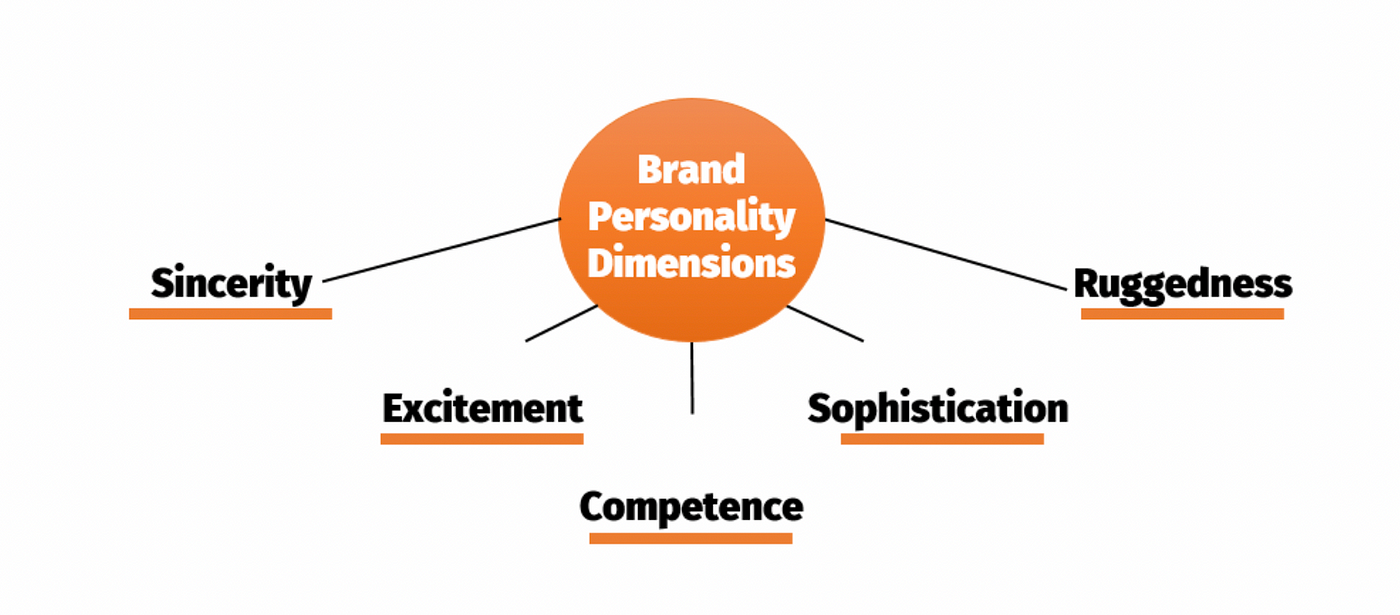
So when going through a product or company brand naming process, thinking about these branding dimensions, is important. We also think the same is true when thinking about your personal brand.
The Brand Personalities Defined
Your brand personality is a reflection of who you are or who you want to become. It’s a tool to help you refine your understanding of your values, your mission, and your unique market proposition. To really understand your brand personality, and what brand name attributes ring true to you, you should review these brand personality dimensions (or any others that you think more accurately reflect who you are) and their associated attributes:
- Sincerity: wholesomeness, integrity, warmth, honesty
- Excitement: youthfulness, energy, creativity, cheekiness, playfulness
- Competence: reliability, skillfulness, intelligence, dexterity
- Sophistication: elegance, luxuriousness, exclusivity, gracefulness
- Ruggedness: outdoorsiness, toughness, adventurousness
While you may feel many of these attributes apply to you at different points of your life, think about which dimension or two is the closest fit.

And in some cases, you may want to adopt a brand name for your new business or product that is not your personal brand. There are many reasons for this including:
- Growing your business into areas outside of your comfort zone
- Bringing other talent and egos into your brand besides your own
- Not diluting your personal brand by associating with side hustles
Here are some other considerations when it comes brand naming, especially if you want to create a new personal brand that isn’t your given name.
Choosing the right brand name style that perfectly captures the essence of your new business or product is a crucial step in the branding journey. However, it’s not necessary to have a fixed style in mind before you dive into the creative brainstorming process, or “NameStorming,” as we fondly refer to it.

Think of it like shopping for clothes: you often pick a range of styles and sizes off the racks. It’s only in the dressing room, when you try them on, that you truly discover what suits you best. This trial-and-error approach is enlightening, helping you decide what to keep and what to leave behind.
Similarly, in the naming process, we advocate for a broad exploration, encouraging you to experiment with and iterate on different brand name styles until you find the one that resonates.
Let’s dive into six different brand name styles to consider for your business or product.
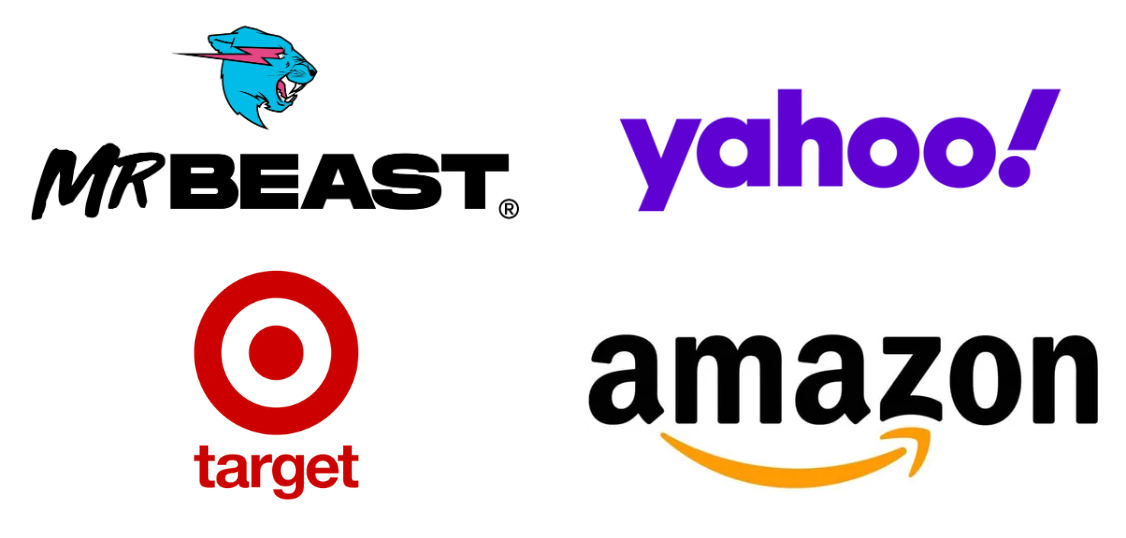
Evocative
Evocative brand names are usually real word names that aren’t descriptive or indicative of what the company or product is. Because evocative names tend to be disconnected from the goods and services of the company, they can create an opportunity to become an impactful powerhouse brand that is greater than the products and services it offers. Evocative brand names rely on our existing emotional association with certain words or sounds, even associations we don’t understand or immediately recognize. Evocative names can be entirely unfamiliar, as long as they make people feel something.
We’ve seen this to be true with Amazon who has now become an umbrella of every kind of product and service consumers could possibly want. The downside of evocative brand naming is that it usually requires a substantial marketing budget to educate consumers about who the company is and what they have to offer. These names also tend to be dangerous and unwieldy because they can bring so many memories/feelings to customer’s minds.
MrBeast and Target are examples of evocative brand names that have pre-existing associations. Both of these brands used those associations to their advantage. Yahoo is an example of an evocative brand name that’s more instinctual than learned; Yahoo isn’t a real word, and yet it evokes the sound of celebration of success.
Evocative brand names can work for all five brand personalities, as long as you match the emotion you’re attempting to evoke with the brand — you wouldn’t want a Yahoo-like name for a business projecting sincerity, for example.
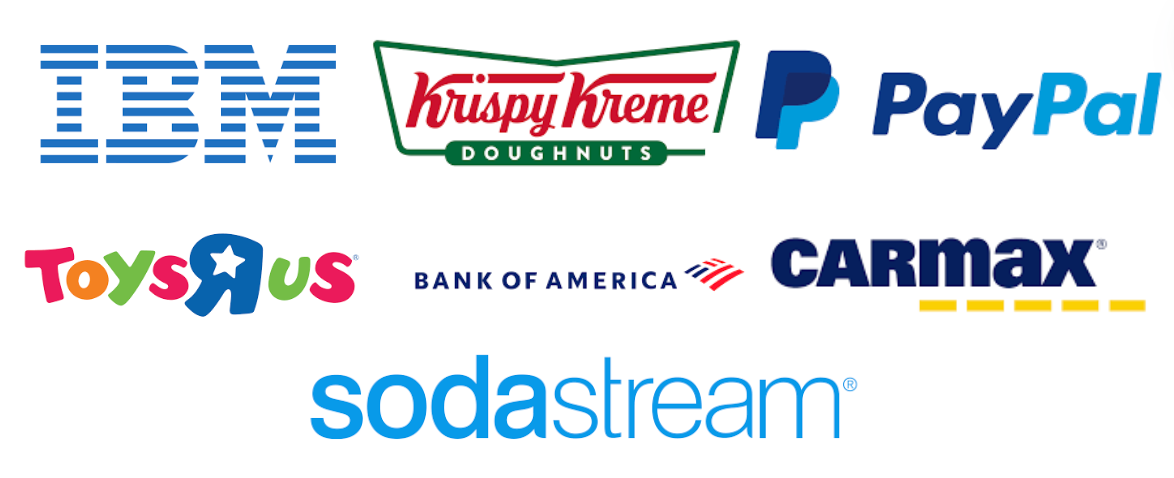
Descriptive
Descriptive brand names are the opposite of evocative. Descriptive brand names tend to be more literal, without much room for playfulness, such as International Business Machines or Bank of America. Such names directly convey what a brand offers, making them accessible to a wider audience and more straightforward to grasp, which in turn can lead to savings in marketing expenditures. This straightforwardness often suits more corporate brands, but even they need to tread carefully to avoid descriptive names that are too boring and unmemorable for your target audience. Descriptive brand names can be a bit stodgy, but many work well. And some can still be enticing, like Krispy Kreme.
Brands like CarMax, ToysRUs, SodaStream, and PayPal serve as prime examples of descriptive brand names, instantly communicating their core offerings with minimal need for further explanation. These “almost-there” names simplify messaging, reducing the need for hefty advertising investments. Yet, the path to securing these descriptive, direct names is fraught with challenges, especially when it comes to navigating trademark registrations and acquiring the matching dot-com domain in a crowded and competitive naming landscape.
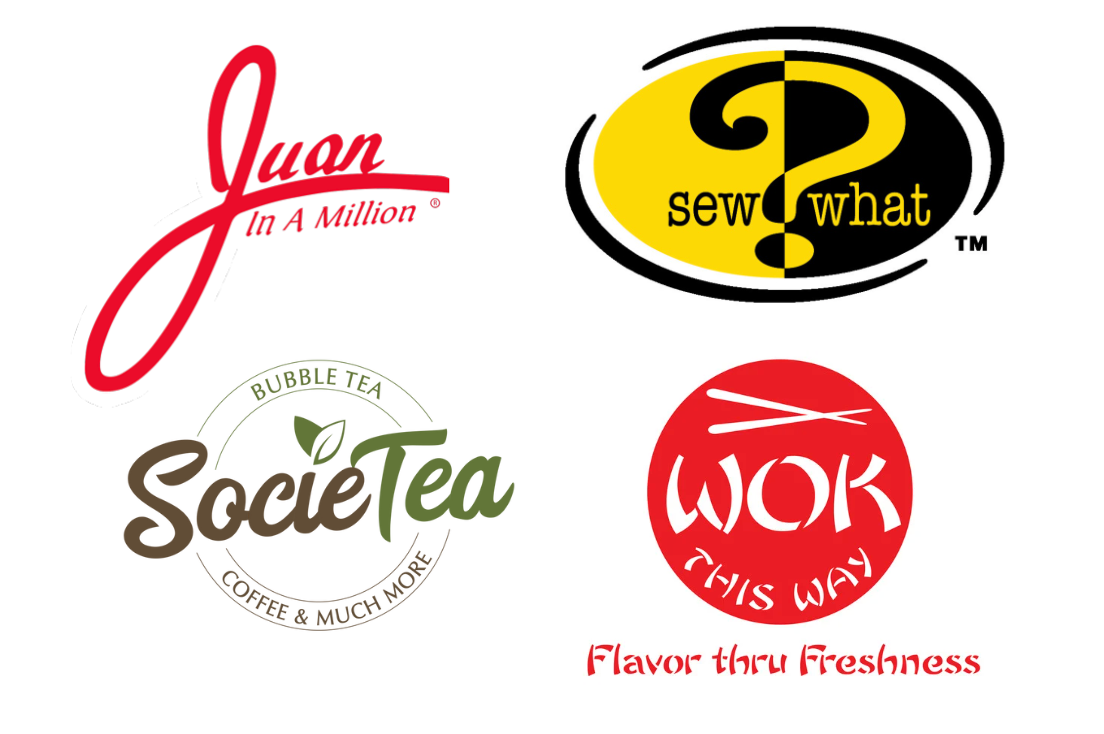
Play on words
Remember all those quirky sayings, clever wordplays, and amusing puns your dad loves to crack? Well, it’s time to give him a call and express some gratitude for his wit, especially when diving into the world of brand naming.
Play on words or wordplay brand names apply to idioms, puns or double meanings, often experimenting with root words in romance languages or combining existing English words to create something both new and familiar. Examples include Sew What (a sewing shop), Juan In A Million (a Mexican restaurant), SocieTea (a tea shop) and Wok This Way (a Chinese restaurant). These brand names span multiple name types, but all convey something about their respective brand’s personality.
NameStormers worked on a project for the American Association for the Advancement of Science (AAAS), where we coined the term “Science on Tap” for a new digital science newsletter. The clever name, aimed at millennials, plays on the idea of making science as accessible and enjoyable as a cold drink at a bar.
Pushing the creative envelope even further, NameStormers assisted a mobile health screening startup in boldly naming their service “HealthYES!” The founders were on a mission to remove the fear associated with preventative screenings, ensuring the name was not only health-related but also immediately engaging and reassuring for potential clients.
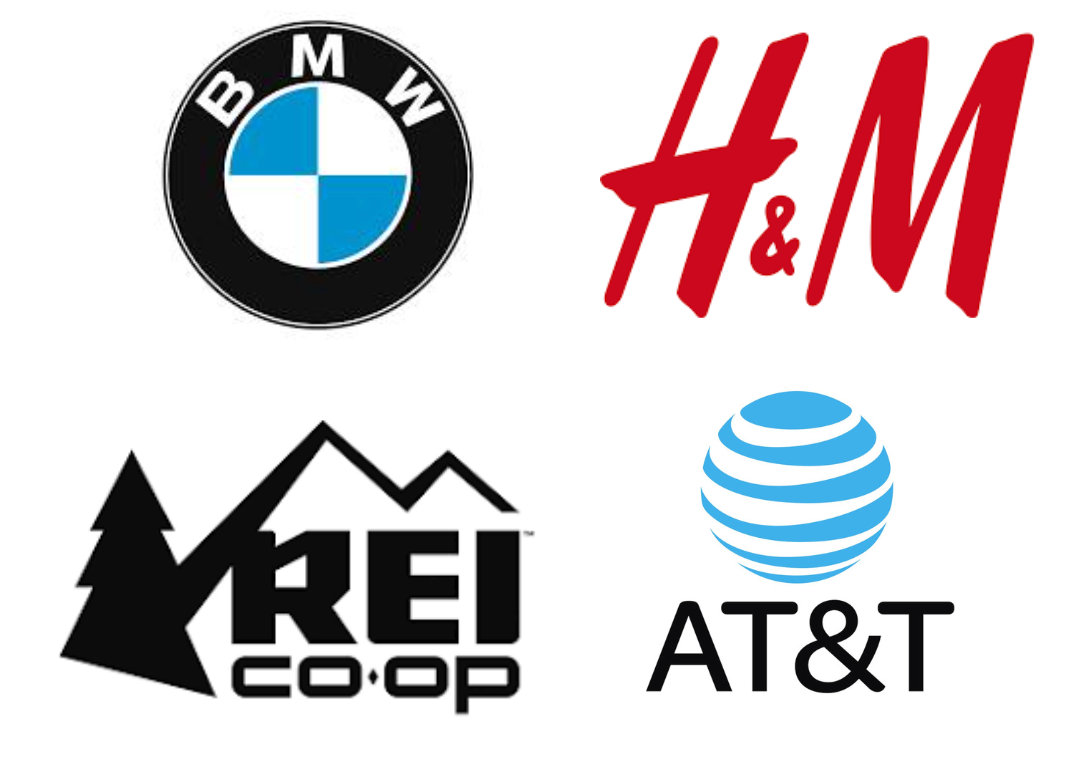
Acronym
Acronyms like REI, H&M, AT&T, and BMW are household names, despite the fact that many of us might scratch our heads if asked to spell out what each letter stands for. Their success might suggest that acronyms are a shortcut to brand recognition and loyalty, but it’s not that simple. The secret sauce for these brands isn’t just their snappy acronyms; it’s the years of industry presence and hefty marketing investments that have cemented their place in consumer minds. Moreover, these acronyms often carry historical baggage that’s disconnected from the brand’s current identity. Take H&M, for instance—it’s not an abbreviation for any of their product lines but stands for Hennes & Mauritz, a detail that might leave many modern shoppers puzzled. In today’s fast-paced market, choosing a random assortment of letters and expecting them to resonate with consumers like REI or BMW might just lead to indifference or bewilderment rather than brand attachment.
Unless your acronym spells out a recognizable word that suits your brand personality, your target audience is going to have a hard time recalling the alphabet soup of random letters. Taking into account that most three- and four-letter words are already trademarked, there isn’t much potential in acronym brand names functioning as words — but never say never! Sometimes a brilliant idea can surprise even the naming experts. J.Lo, while not completely an acronym, is a great example of a pithy abbreviated brand name.

Personal/geographical
Personal and geographical brand names can be limiting, but they work for certain industries and brand personalities. Consider brands like Gucci, Hilton, Adidas, and J.P. Morgan — sophistication and sincerity tend to pair well with personal names. While geographical brand names can make future expansion difficult, they work well for certain regional brands. Southwest Airlines is a great example of a brand name that changed its brand positioning rather than changing its name when it expanded from just Southwest to other parts of the globe. SouthWest became a style of customer service, service that reflected a SouthWest state of mind, hospitality, and attitude.
Like the brand personalities, these different brand name types may be combined together. A descriptive name can become an acronym for brevity’s sake (take IBM, for example), or a personal name can become a play on words (e.g., Amy’s Winehouse).
Choosing to name your brand or business after yourself can be a great choice if you fall into one of these niches:
- You Are the Essence of Your Brand: If you’re the face of your business, like a celebrity (think JoJo Siwa), a podcast personality, or a thought leader in your domain (à la Dave Ramsey), leveraging your name as your brand can be highly effective, and perhaps even the most strategic move for your success.
- You Bring Something Unique to the Table: Have you invented a groundbreaking technology, devised a novel methodology, or are pioneering in your field? In such cases, attaching your personal name to your brand can add a layer of authenticity and innovation that distinguishes your offering.
- Your Name Has a Natural Flair: Imagine having a surname like “Sas” that carries a vibe and personality all its own. For certain businesses, especially those where a bit of pizzazz is a bonus, a catchy personal name could be a branding goldmine.
However, there’s a crucial consideration for those thinking of a personal brand name. As your business expands, your personal commitment and involvement become even more critical. A brand named after its founder demands that the namesake remains deeply engaged over the long haul. Departing too soon could jeopardize the brand’s integrity and future prospects.NameStormers is passionate about finding a name style or combination of styles that works perfectly for your brand- personal or otherwise.
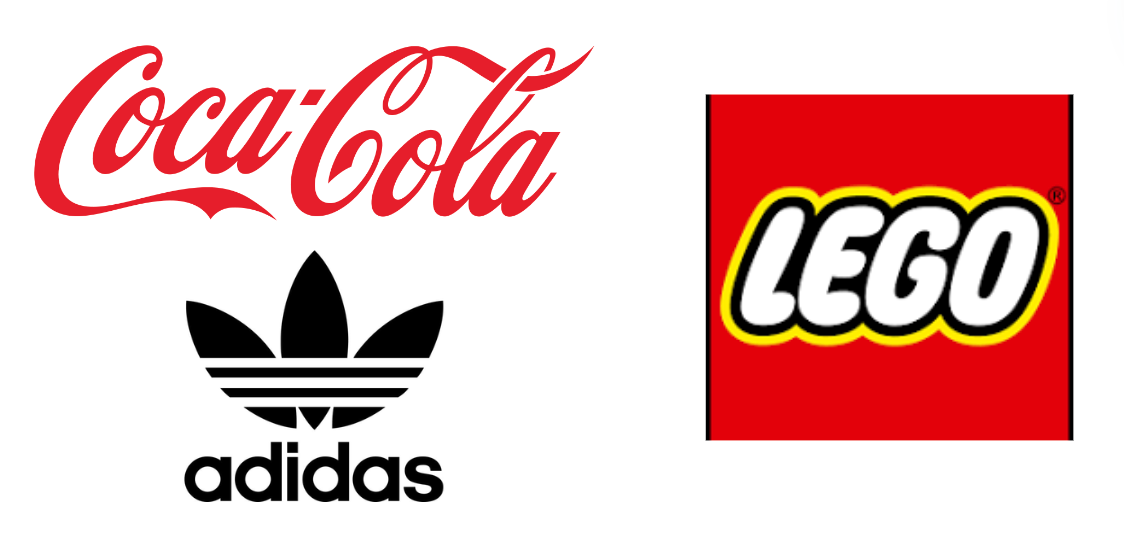
Invented Brand Names
Many invented brand names (also called coined or made-up) have become household names like Coca-Cola, Lego, and Adidas. These invented brand names are staples of American culture- yet, we don’t even know what they mean. How can a brand name with no context or inherent meaning be a good strategy for your brand? An invented brand name can have many benefits besides being easier to get through trademark screening. Having an invented brand name usually means a lower likelihood of confusion with another established brand. It also creates the opportunity to build your brand from scratch with no prior associations, meanings, or linguistic hurdles you’ll likely experience with real-word or descriptive names.
Work with NameStormers
For nearly 40 years, NameStormers has been working as a brand name consultant with brands of all shapes and sizes. We can come up with perfect-fit names that communicate your brand’s values to the world while appealing to your target audience. Our seven-step process produces viable, memorable, and original names, and our additional services like name testing and linguistic testing ensure that no stone is left unturned. Get in touch with us today to get started on creating your unique brand name.



